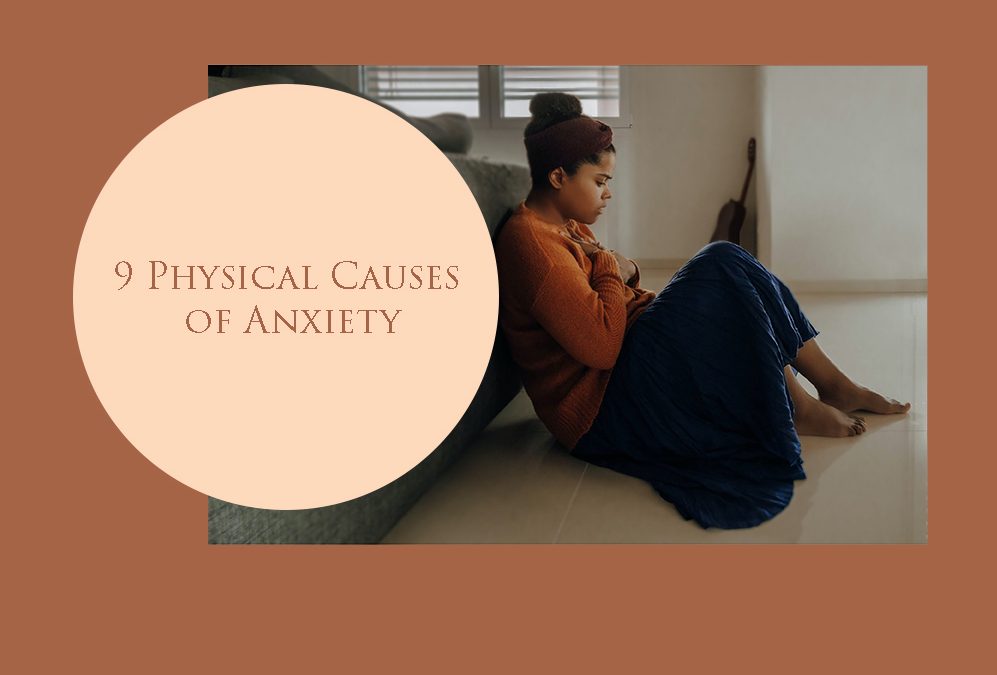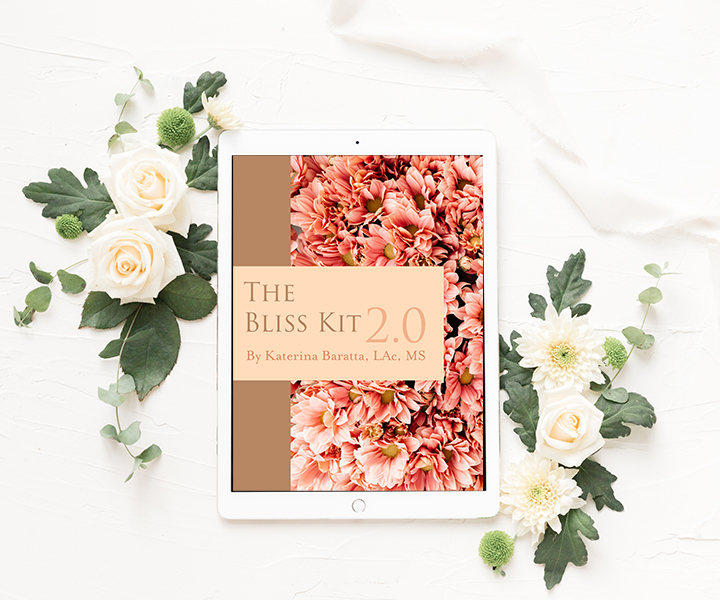9 Physical Causes of Anxiety
Anxiety is called a mental health issue, but that’s not all it is.
In reality, anxiety is just as much a sign of imbalance in the body.
And when you reduce your understanding of anxiety to a mental health issue alone, you blind yourself to many of the biggest factors that impact how you feel beyond what’s going on in your head.
Because anxiety is a full body experience.
Anxiety only arises when there’s a stress response happening in your body.
And while you might feel like it’s your thoughts that are making you anxious, it actually goes both ways.
Here’s the deal.
Anxiety is a response to stress.
And when your body is stressed, your mind tries to find a way out of that stress.
It does this by sending you thoughts based on your past experiences.
Your mind then projects what it knows from the past into an imagined future.
But of course, the future is out of your control.
You can only ever act in the here and now of the present moment.
And the attempt to control the uncontrollable is what makes you anxious.
When your body is relaxed, on the other hand, you don’t feel anxious.
You can have the exact same thoughts, but if your body isn’t stressed it’s not going to lead to anxiety.
So while a big part of healing anxiety is about observing your thoughts, distancing your sense of self from them through inquiry, and rewiring your neurological patterning, you can’t truly heal if you don’t take an honest look at other factors that are causing stress in your body.
(Click here to get started for free with the Bliss Kit PDF)
Here are 9 physical causes of anxiety to consider:
1. Inadequate Sleep
If I could only give you one tip to improve your mental health it would be to make sure you’re getting enough sleep.
Many people assume that they’re fine getting just 5-6 hours of sleep every night.
They’re not.
Sleep is not optional.
Sleep disruption is associated with a heightened stress response and inflammation, which are linked to anxiety. 1
And studies have shown that even short-term sleep deprivation puts you at higher risk for mood disorders like anxiety and depression. 2
Matthew Walker, a professor of neuroscience and psychology, and the director of the Center for Human Sleep Science at the University of California at Berkley, calls sleep “provides a form of emotional first aid.” 3
In his Ted Talk, Walker explains,
“What we’ve discovered is that sleep will take these difficult, painful experiences, sometimes even moving into the area of trauma.
And it will act almost like a nocturnal soothing balm.
And it will just take the sharp edges off those emotional memories so that when you come back the next day, they don’t feel as emotional anymore.
So, yes, you remember what happened yesterday, but it – you no longer regurgitate that same visceral, emotional reaction that you had at the time of the event.” 4
So how do you optimize sleep?
Walker recommends going to bed and waking up at the same time every day, including weekends.
His second tip is to keep your bedroom cool, at around 65°F.
Unfortunately, anxiety the sleep and anxiety association goes both ways.
In many people, anxiety isn’t just worsened by sleep deprivation, it also causes it.
But there are a lot of other strategies you can try in order to improve your sleep quality, even when you’re feeling really anxious.
Click here to find out how to optimize sleep when you have anxiety.
The food you eat (and don’t eat) can also have a huge impact on your mental health.
Healing traditions from around the world have known the link between food and well-being for millennia.
But modern conventional medicine is just now starting to catch up.
Luckily, awareness is starting to grow as scientific evidence builds. 5, 6
Because the food you eat literally becomes your body.
And not only that.
It also changes your body’s chemistry and physiology, which have a direct impact on your stress levels and mental health.
There are lots of ways that food can change the way you feel.
And the items on this list are definitely worth looking into when it comes to your own diet.
2. Nutrient Deficiencies
Vitamins and minerals help your body function.
And when you’re deficient in a vitamin or mineral, your body has to work extra hard to do what it needs to do to keep you alive.
This is stressful.
Unfortunately, even though scientific evidence is slowly starting to confirm the link between nutrient deficiencies and mental health, studies are still lagging.
The hope is that there will be more studies in the future that investigate the connection between food and mental health.
In the meantime, here’s some of the evidence we’ve got so far.
• Vitamin D
Vitamin D is widely known to be an essential nutrient for bone development because of it’s ability to help regulate the amount of calcium and phosphate in the body. 7
But another very important function of vitamin D is to regulate the nervous system, and therefore may have a direct effect on mood. 8
And studies have confirmed that vitamin D supplementation can reduce anxiety. 9, 10
But as is the case with all nutrients, the best way to absorb vitamin D is directly from the source.
And the best source of vitamin D is sunlight.
To get enough vitamin D from the sun, you have to spend about 20 minutes in direct sunlight every day without protection (a.k.a. sunscreen, shade, and clothing).
If you don’t get this (most people don’t) then you need to supplement to keep your vitamin D levels up.
1000 IU of vitamin D3 is the standard recommendation for most adults, but check with your health care provider to find out what’s best for you.
• Omega 3 fatty acids
Omega 3 fatty acids have a direct effect on the central nervous system, and have been shown to have a direct effect on many diseases, including anxiety. 11, 12
The best sources of omega-3 fatty acids that the body can easily use are fatty fish like salmon, herring, sardines, and mackerel. 13
Non animal sources of omega-3’s include flaxseeds, chia seeds, and walnuts, but it’s a bit trickier for your body to convert into useable form.
• B12
B-complex vitamins, and especially B12, can have a noticeable impact on mental health.
A 2017 study published in the Journal of Biomedical and Clinical Research showed a clear link between low levels of B12 and depression and anxiety. 14
And a 2018 study published in the Journal of Functional Foods showed that eating B12-rich spreads like marmite, Vegemite, promise, and aussiemite containing brewer’s yeast (also known as nutritional yeast) improved anxiety and stress. 15
If you’re vegan or vegetarian, it’s a good idea to include brewer’s yeast in your meals every day to keep B12 levels up.
Because aside from yeast, B12 is mostly found in animal products like beef liver, clams, tuna, salmon, and yogurt.16
And symptoms of deficiency can take some time to show up, so it’s important to be on top of your nutritional game when it comes to B12.
• Magnesium
Popular for its laxative properties, magnesium actually plays a vital role in a huge number of processes in the body, including protein synthesis, muscle and nerve function, blood glucose control, and blood pressure regulation.
And a 2017 systemic review of 18 studies published online in the medical journal Nutrients showed that magnesium supplementation can help people reduce anxiety who are already prone to it. 17
But, as always, getting your nutrients straight from the source is best.
And lucky for you, magnesium is found in lots of delicious foods that are easy to incorporate into your meals every day.
Some of the best sources include: pumpkin seeds, chia seeds, almonds, spinach, cashews, black beans, edamame, baked potatoes, brown rice, yogurt, oatmeal, and more. 18
So basically, if you eat a big bowl of oats with nuts and seeds in the morning you’re pretty much going to be set on your magnesium intake for the day.
But there are lots of other magnesium-rich foods out there if oats don’t go with your cup of tea.
Plus, magnesium supplements (or decadent, magnesium-rich and anxiety-reducing epsom salt baths) are always an option if you can’t work it into your diet. 19
3. Inflammation
Chronic, low-grade inflammation is another physical factor that can lead to anxiety.
But as opposed to nutrient deficiencies, inflammation has more to do with what’s already in your body than what’s missing from it.
Because while inflammation is your body’s natural response to rid itself of viruses and bacteria, it can also happen in response to other substances that go against its ability to its job and thrive.
And if inflammation goes on for a long time, chronic low-grade inflammation has been associated with mental health issues like stress, anxiety, and depression. 20, 21, 22
Which makes sense, because anytime the body has to work hard just to keep its equilibrium, your sense of well-being will be affected.
Some other factors that can contribute to inflammation include inadequate sleep, food intolerance and sensitivity, poor gut health, eating pro-inflammatory foods, and a sedentary lifestyle.
4. Food Intolerance and Sensitivity
Food allergies, intolerances, and sensitivities are three different things, but they can all lead to mental health issues. 23
A food allergy is when your body mistakes a specific ingredient for a pathogen and sets off an immune reaction to try to get rid of it.
Unfortunately, the immune response can be so strong that it can end up being life-threatening.
So if you have a food allergy you really need to avoid that food completely unless you’re training your immune system under the direct supervision of a medically trained allergist.
A food intolerance isn’t as dangerous but can still be really uncomfortable.
It happens when your body can’t digest a specific food.
If you consume that food it ends up sitting in your digestive tract and can lead to inflammation and other uncomfortable symptoms like gas, bloating, loose stools, constipation, headaches, nausea, etc. 24
The most common food intolerance worldwide is lactose intolerance, which happens when your small intestine doesn’t produce enough of the enzyme lactase to break down milk products.
It’s estimated that 36% of the U.S. population is lactose intolerant, but you can have an intolerance to other foods as well. 25
Celiac disease is an example of an autoimmune food intolerance.
When people with celiac disease eat products containing gluten, their body mounts an immune response that blocks their ability to absorb nutrients.
Celiac disease isn’t usually immediately life-threatening, but if gluten continues to be eaten the small intestine will be damaged and health consequences can be dire. https://celiac.org/about-celiac-disease/what-is-celiac-disease/
About 1 in 100 people worldwide have celiac disease.
But many more have a sensitivity to gluten when they eat too much.
Food sensitivities happen when you eat too much of a specific food and end up with uncomfortable symptoms like joint pain, stomach pain, fatigue, rashes, brain fog, inability to focus, PMS, and other mental health issues as a result. 26
Most people have food sensitivities and don’t realize that the food they’re eating is causing these problems.
Symptoms are often mild and sometimes they don’t show up until 2-3 days later, so the association isn’t obvious. 27
And a lot of it comes down to gut health, which can be healed.
Food allergies can be spotted through blood tests.
But because they’re not always an immune reaction, the best way to figure out if you have a food intolerance or sensitivity is through an elimination diet.
Still, it’s best to be cautious.
Elimination diets can come with challenges that lead to malnutrition if they’re not done right.
And as you now know, nutritional deficiencies can lead to more stress and anxiety.
So it’s best to only do an elimination diet under the supervision of a trained health care practitioner who has experience in this realm, (which I happen to be).
Email me now if you’d like to set up a free consultation to talk about getting a plan customized just for you.
5. Poor Gut Health
Of all of the topics covered in this article, poor gut health might be the most widely accepted physical cause of anxiety in the conventional medical community.
It’s become a bit of a hot topic in scientific circles.
And as a result, we have a lot of evidence linking gut and brain health.
The bacteria in your gut, also called your microbiome, are absolutely essential to mental health.
When the balance of bacteria is off, it throws your whole system off.
For example, did you know that about 95% of serotonin, the neurotransmitter that’s targeted in major depressive disorders (and has a whole lot of other functions to boot) is created in the gut?! 28
This means, if you have an unfavorable population of bacteria in your gut it could directly affect your happiness.
Studies have also shown that defensive molecules the gut produces during infection, called inflammatory cytokines, disrupt brain neurochemistry and make people more vulnerable to anxiety and depression. 29
But just like sleep, the relationship goes both ways.
In a 2011 study in mice that was published in Brain, Behavior, and Immunity, Bailey, Lyte and colleagues examined how stress changes the microbiome and increases inflammation, which of course can make anxiety even worse. 30
A lot of people take probiotic supplements these days, but one of the best ways to support gut health is by eating pre and probiotic foods.
6. Alcohol, Caffeine, Sugar, Processed and Refined Foods
This one’s really straight forward.
Alcohol increases inflammation, and has been directly linked to anxiety and other mental health issues. 31, 32
Caffeine mimics your body’s stress response by increasing your heart rate and moving energy into your muscles.
And for a lot of people this physical reaction makes anxiety worse. 33
Sugar makes it harder to cope with stress. 34
And blood sugar imbalance (when your blood-sugar spikes and then dips) has been shown to cause anxiety. 35
Beyond straight candy, any processed or refined food can impact blood sugar stability.
Processed foods tend to contain artificial sugars.
And refined foods have gut-healthy fiber removed, so the sugars in them get absorbed too quickly.
This spikes your blood-sugar and leads to a rapid crash, which directly affects your brain and can lead to symptoms like irritability and anxiety. 36
7. Dehydration
You’ve heard that you’re supposed to drink 8 glasses of water per day.
But did you know that hydration has a direct impact on mental health?
A 2018 large cross-sectional study published in the World Journal of Psychiatry showed that drinking plain water is associated with decreased risk of depression and anxiety in adults. 37
And a 2019 study showed that both Chinese and American participants who were dehydrated slept less, which we already know can affect anxiety levels. 38
8. Too much air, not enough earth
Most of the physical causes of anxiety on this list are based on modern scientific research.
But this one comes from the Ayurvedic understanding of health and wellness that’s been around for thousands of years.
In Ayurveda, anxiety is said to come from too much Vata.
Vata is related to the air element, and is characterized by dryness, lightness, and mobility.
When you have too much Vata in your system, you feel ungrounded and anxious. 39
To balance Vata, you want to increase your connection to the earth and stabilize your lifestyle.
Two ways to do this are to eat more warm, soupy, nourishing foods, especially with root veggies.
And you also want to create a solid routine to give your day structure.
Fall is when Vata is strongest.
So the holistic diet and lifestyle factors that keep you balanced in fall are going to serve you well anytime you feel anxious.
9. Sedentary Lifestyle
Exercise isn’t just important for physical health.
It has a profound impact on mental health as well.
A 2015 systemic review published in BMC Public Health looked at 9 studies and showed that there is evidence that a sedentary lifestyle is associated with elevated anxiety. 40
Other studies have shown that moderate aerobic exercise (that slightly increases your heart rate and makes you sweat just a bit) can decrease the incidence of mental health issues, including anxiety. 41, 42
The key takeaway here is that you don’t need to go to a gym and do heavy workouts 5 days a week to feel the benefits.
Just 30-60 minutes of moderate physical activity, 3-5 times per week is enough to improve mental health. 43
(And yes, vacuuming, kitchen dance-parties, and brisk walks all count!)
Any more than 360 minutes of moderate exercise per week, and you could actually make yourself more anxious (whodathunk that?!). 44
Want an extra boost?
Take it outside.
More and more studies are demonstrating a clear link between fresh air, exposure to nature, and mental health. 45, 46
Now, knowing what to do and actually doing it are 2 different things.
And honestly, there’s never a one-size-fits-all approach when it comes to health.
If you want to learn how to modify your own diet and lifestyle to reduce stress and anxiety holistically, I might be able to help.
Send me an email now to set up a free consultation and find out if holistic mental health coaching is right for you.
I can’t wait to see where this takes you!
References:
- https://www.ncbi.nlm.nih.gov/pmc/articles/PMC5449130/
- https://healthysleep.med.harvard.edu/need-sleep/whats-in-it-for-you/mood
- https://www.npr.org/transcripts/964209001
- https://www.ted.com/talks/matt_walker_sleep_is_your_superpower?language=en
- https://pubmed.ncbi.nlm.nih.gov/32447382/
- https://pubmed.ncbi.nlm.nih.gov/28707609/
- https://www.nhs.uk/conditions/vitamins-and-minerals/vitamin-d/
- https://pubmed.ncbi.nlm.nih.gov/23744412/
- https://pubmed.ncbi.nlm.nih.gov/32945627/
- https://onlinelibrary.wiley.com/doi/full/10.1002/brb3.1760
- https://pubmed.ncbi.nlm.nih.gov/30127751/
- https://pubmed.ncbi.nlm.nih.gov/30646157/
- https://ods.od.nih.gov/factsheets/Omega3FattyAcids-HealthProfessional/
- https://sciendo.com/article/10.1515/jbcr-2017-0023
- https://www.sciencedirect.com/science/article/abs/pii/S1756464617307077
- https://ods.od.nih.gov/factsheets/VitaminB12-HealthProfessional/
- https://www.ncbi.nlm.nih.gov/pmc/articles/PMC5452159/
- https://ods.od.nih.gov/factsheets/Magnesium-HealthProfessional/
- https://pubmed.ncbi.nlm.nih.gov/28445426/
- https://www.biorxiv.org/content/biorxiv/early/2019/04/19/609768.full.pdf
- https://www.ncbi.nlm.nih.gov/pmc/articles/PMC6529779/
- https://www.nature.com/articles/tp201327
- https://www.integrativepsychiatry.net/is-there-a-connection-between-food-allergies-and-mental-health/
- https://www.health.harvard.edu/blog/food-allergy-intolerance-or-sensitivity-whats-the-difference-and-why-does-it-matter-2020013018736
- https://www.niddk.nih.gov/health-information/digestive-diseases/lactose-intolerance/definition-facts
- https://journals.sagepub.com/doi/abs/10.1177/026010608900600303
- https://www.integrativepsychiatry.net/is-there-a-connection-between-food-allergies-and-mental-health/
- https://www.apa.org/monitor/2012/09/gut-feeling
- https://www.ncbi.nlm.nih.gov/pmc/articles/PMC5641835/
- https://pubmed.ncbi.nlm.nih.gov/21040780/
- https://www.ncbi.nlm.nih.gov/pmc/articles/PMC4068736/
- https://www.ncbi.nlm.nih.gov/pmc/articles/PMC6927748/
- https://www.cambridge.org/core/journals/advances-in-psychiatric-treatment/article/neuropsychiatric-effects-of-caffeine/7C884B2106D772F02DA114C1B75D4EBF
- https://www.psychologytoday.com/us/blog/where-science-meets-the-steps/201309/4-ways-sugar-could-be-harming-your-mental-health
- https://pubmed.ncbi.nlm.nih.gov/18325546/
- https://sph.umich.edu/pursuit/2019posts/mood-blood-sugar-kujawski.html
- https://www.ncbi.nlm.nih.gov/pmc/articles/PMC6147771/
- https://pubmed.ncbi.nlm.nih.gov/30395316/
- https://chopra.com/articles/an-ayurvedic-approach-to-anxiety
- https://bmcpublichealth.biomedcentral.com/articles/10.1186/s12889-015-1843-x
- https://cdn.website.thryv.com/f6231140dee0466dbcd61b6138c7f98c/files/uploaded/3.effectsofphy..pdf
- https://europepmc.org/article/med/15518309
- https://www.discovery.com/science/How-Little-Exercise-It-Takes-Boost-Your-Mental-Health
- https://www.medicalnewstoday.com/articles/322734
- https://www.ncbi.nlm.nih.gov/pmc/articles/PMC5580555/
- https://greatergood.berkeley.edu/article/item/why_forest_bathing_is_good_for_your_health





